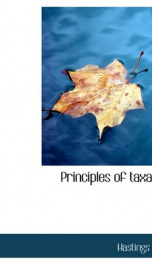principles of taxation

Purchase of this book includes free trial access to www.million-books.com where you can read more than a million books for free. This is an OCR edition with typos. Excerpt from book: CHAPTER III SHOULD ALL PROPERTY BE TAXED ALIKE? We have come, then, to the general conclusion that the value of property affords a sound basis for levying a large part of our taxes. So far in discussing our subject we have indicated as little as possible that there are various classes of property. Property and wealth not synonymous Before going further we must recognize the fact that the term "property " is a legal rather than an economic term. Yet we are discussing taxation primarily as an economic rather than as a legal matter. Much of our practice in taxation has confused the legal word "property" with the economic word "wealth," and has gone ahead as if they were synonymous. Much of the common misconception of taxation matters rises out of an unconscious assumption that wealth in its technical economic sense is the same thing as wealth in popular meaning. In order to facilitate our discussion we will not attempt to stick to the economic distinction of land and capital, except when considering some such matter as the proposal to tax land exclusively or at a different rate from capital, which requires us to recognize the distinction. Otherwise we are discussing the taxation of wealth, and from both the popular and accounting standpoint, all wealth used in production, whether capital in the economic sense or land, is capital, and we shall speak of it as such. The legal term "property" covers a great deal that has nothing to do with the economic term "wealth." In any precise sense, useful for economic thinking, wealth means always some material thing. Houses, lands, cattle, tools, machinery, factories, jewels, paintings constitute wealth. Ownership of all these things comes within the term "property," but property covers many things that are not wealth at all. If... --This text refers to an alternate Paperback edition.
Info about the book
Author:
Series:
Unknown
ISBN:
1587787563
Rating:
3.5/5 (1)Your rating:
0/5
Languge:
English
Users who have this book
Users who want this book
What readers are saying
What do you think? Write your own comment on this book!
write a commentif you like principles of taxation try:
Other books by this author
Do you want to exchange books? It’s EASY!
Get registered and find other users who want to give their favourite books to good hands!


